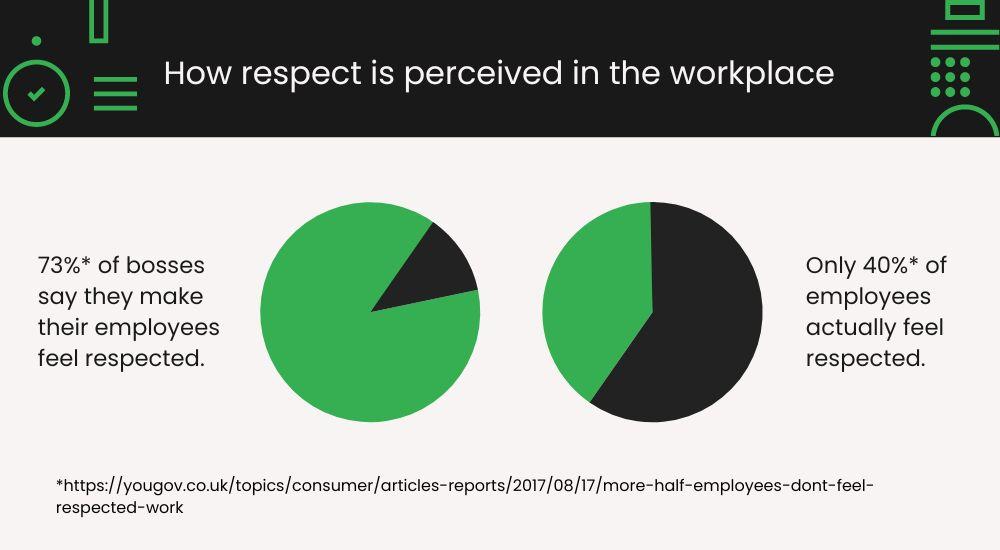As a business owner, you have worked hard to create a successful business and build it from the ground up. You know that the key to continued growth and success is having excellent people by your side. That's why you have devoted so much of your time and energy to sourcing, recruiting, and training top-notch professionals who are passionate about their work and committed to helping you reach your goals.
But when more than 50 million workers left their roles in 2022, and replacing an employee can cost 1.5 to 2 times their salary, the question is, how can you keep yours around? And how can you make sure you're getting the best out of your team, now and in the future?
According to a recent study, 57% of those who left their employers in 2021 did so for one glaring reason—they didn't feel respected.
So with the labour market being as competitive as ever, this is something we can't afford to ignore.
What it means for business owners
“Respect is like air. As long as it’s present, nobody thinks about it. But if you take it away, it’s all that people can think about.”
- Kerry Patterson, Joseph Grenny, Ron Mcmillan, Al Switzler
To say that most bosses or managers treat their employees disrespectfully would not be accurate. Generally speaking, most leaders strive to create a positive environment and treat everyone in the same polite and friendly manner.
But when so many surveys and reports on employee experiences are reporting similar results (that only around half of employees feel respected at work), it's clear that something is getting lost in translation.

'Disrespect' and 'lack of respect' are often used interchangeably, but according to experts, there are some key differences to bear in mind.
"Employees feel disrespected when others act in ways that violate or undermine their worth," says Dr. Kristie Rogers, associate professor of management at Marquette University, Milwaukee. "Disrespect is often tied to instances of incivility or mistreatment, is perceived as intentional or malicious, and is especially impactful when it comes from a manager. On the other hand, a lack of respect is simply an absence of acknowledging someone's worth."
While it’s easy to get wrapped up in the day-to-day of running your company, the best organizations understand that the benefits of making employees feel valued and respected don’t just begin and end with your teams, they impact your business, too.
Performance
"Employees who say they feel respected are more satisfied with their jobs and more grateful for—and loyal to—their companies," says Dr. Rogers. "They are more resilient, cooperate more with others, perform better and more creatively, and are more likely to take direction from their leaders."
And when leaders treat their teams with respect, they create an environment that fosters trust. Team members feel comfortable offering honest feedback, which helps leaders make better decisions, solve problems more effectively, and enhance their own performance in turn.
Unsurprisingly, you can expect a significant downturn when team members experience disrespect. During their investigation into the price of incivility in the workplace, management and leadership experts Dr. Christine Porath and Dr. Christine Pearson found that:
- 48% intentionally decreased their work effort.
- 47% intentionally decreased the time spent at work.
- 38% intentionally decreased the quality of their work.
- 80% lost work time worrying about the incident.
- 63% lost work time avoiding the offender.
- 66% said that their performance declined.
- 78% said that their commitment to the organization declined.
- 12% said that they left their job because of the uncivil treatment.
- 25% admitted to taking their frustration out on customers.
In a recent interview, The Huffington Post founder Arianna Huffington told Forbes, “When you make sure that your employees are feeling seen, heard, and respected and you help take care of their wellbeing, that employee experience directly impacts customer success.”
Retention
According to a survey by Gallup and Workhuman, employees who feel respected are five times more likely to stay with their organizations, recommend them to others, and speak positively about them. They're also a staggering 73% less likely to report being burned out.
A happy, loyal, and productive workforce doesn't just boost your bottom line, it dramatically reduces the time and resources you'd have to spend on hiring, training, and replacing employees. New hires can cost companies over $4,000 each through recruitment costs, training, and management time during the onboarding process, and it's estimated that it takes around 12 months for a new employee to reach peak performance potential.
So when respect can mean the difference between a positive and productive environment and one that is full of resentment and frustration, let's look into some expert strategies to ensure every team member feels like the MVP they truly are.

1. Stay in touch
There's a lot of power in taking the time to check in with your team.
In 2022, leadership experts and authors Jack Zenger and Joseph Folkman collected data from 4,849 employees to determine which leadership behaviors correlated most strongly to employees feeling respected in the workplace. Among the top examples that employees cited was when their leader made an effort to keep in regular contact with their team.
Scheduling regular meetings with your employees means you're carving out dedicated moments to tap into the pulse of your team. This consistent touchpoint gives every member the reassurance of knowing they have a set time with you to highlight any concerns, or simply discuss their work.
Depending on the size of your business, it may be much easier said than done to hold regular meetings with each and every team member! But at the very least, make sure you meet with your direct reports so that you can discuss goals, check in on progress, give feedback, brainstorm new ideas together, or just ask how they're doing.
2. Ask for their opinion (and actively listen)
Great leaders know their team is a wealth of collective experience and insight that can contribute to their company's success, and it all starts with a sincere invitation for them to share their ideas.
Not only is it a powerful way to stay connected, engaged, and on the same page, but in doing so, you’re reinforcing an important message: you value their experience and their voice.
But it takes more than just asking the question to have a respectful and meaningful discussion.
Chances are, we can all remember a situation where you were talking and it's clear the other person was mentally drafting their grocery list or making plans for the weekend. It can be incredibly frustrating and disheartening when someone's not paying attention or simply waiting for their turn to speak, especially when you're opening up about an issue.
Active listening involves giving your full attention when someone is speaking, taking time to process the information, asking questions if needed, responding thoughtfully, and being mindful of body language. Being an active listener allows for meaningful conversations and better understanding between all parties involved. And when team members truly feel heard, they're more likely to share and engage.
3. Give helpful and honest feedback
It goes without saying that feedback is essential for making sure your business runs smoothly and successfully. Without it, your teams may not know how they are performing, what areas need improvement, or where their strengths lie.
While it may come as little surprise to hear that Zenger and Folkman's study found that feedback can play a crucial role in how they feel respected, the key is in how it's delivered.
According to their findings, they advise that feedback should fairly reflect the person’s performance. For example, if an employee does 90% of their work correctly and 10% incorrectly, you should aim to give 90% positive feedback and 10% corrective. "In many cases, leaders give 0% positive and 10% corrective feedback, which implies that all the leader cares about or notices are errors," they explain. When feedback is only given to point out negatives, this leads to employees feeling disrespected.

4. Balance 'getting results' with the realities of life
As a business owner, it can be easy to get tunnel vision when you've got targets to meet or projects to complete. While striving for results is important, it is equally crucial to remember the people who work hard to make those results possible.
Whether it's kids getting sick or cars breaking down, life can throw us a curveball at the most inconvenient times. And according to Zenger and Folkman, how an organization responds in these moments can make or break how someone feels about their role.
Being understanding and supportive of employees during such times can go a long way in helping them feel valued and respected, instead of just another cog in the corporate machine.
Usually, all that's needed is a little flexibility to accommodate their situation, but showing that you respect their lives and commitments outside of work has a huge impact on employee engagement, morale, and overall performance.
5. Grant autonomy
Remember the feeling of starting your own venture? That powerful sense of freedom to chart your own course, make decisions, and be directly responsible for the fruits of your labor? That is autonomy in its purest form.
And chances are, your team members crave a taste of that very feeling.
When employees are given the freedom to take ownership of their work and are trusted by their employer to do so responsibly, it makes them feel respected and valued. You're showing them that you have confidence in their abilities and that you believe in their judgment.
This level of trust and self-accountability can also be a powerful motivator, as well as instill a deeper sense of pride in their work and a greater connection to your company's vision.
6. Maintain fairness and equality
Zenger and Folkman noticed a recurring theme among employees who reported feeling disrespected—being treated differently from others and feeling like they didn't fit in.
So while some may believe that 'fairness' and 'equality' are overused buzzwords, we can't afford to take them for granted. Rather than take it as a given, we must work hard to make sure everyone is given an equal chance to reach their full potential and be vigilant against prejudice and discrimination.
Discrimination or bias can be difficult to detect, however, it's crucial that these issues are taken seriously to reassure your team that your organization is committed to a safe and respectful workplace for all.
A continual commitment to equal opportunities and inclusive practices sends a clear message to each member of your team that their contributions are valued and that they belong in the company.

What’s the bottom line?
Respect is a quality that is both earned and given, and it’s something all team members should feel, no matter whether they’re full-time in-house employees, remote teams, or independent contractors.
Respectful workplaces benefit everyone, enhancing the quality of communication, boosting motivation and morale, and fostering trust and loyalty. With these tips, you can create a more positive working environment that produces better results at every level.











